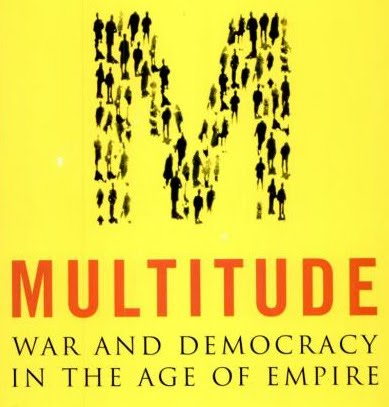Friday, April 18, 2014
Book Review: Multitude by Michael Hardt and Antonio Negri
Reading Multitude: War and Democracy in the Age of Empire, Michael Hardt and Antonio Negri's 2004 follow up to Empire is a maddening exercise. Wrapped in layers of superfluous pedantry and literary digressions, the book's core argument is not terribly complicated. The idea of the multitude is, however, a novel revolutionary construction, albeit without a clear politics to make any practical use of it.
For Hardt and Negri (HN), the "multitude" is a not a unit with a unified identity, unlike the "workers" of Marxist yore. Rather, it is a "multiplicity of... singular differences," (xiv) a group that brings about the possibility of "democracy on a global scale." (xi) This multitude "must discover the common that allows them to communicate and act together" (xv) to resist the Empire, a "new form of sovereignty" (xii) that includes states, corporations, supranational institutions, etc.
The book is divided into three parts, War, Multitude and Democracy. In War, HN lay out our contemporary landscape: we are living in a world of constant, interminable, global civil war, where war is the "primary organizing principle of society." (12) The state of exception that traditionally signified war "has become permanent and general" (7) and this war is "indistinguishable from police activity." (14) However, one should note that the "dominant military power often finds itself at a disadvantage in asymmetrical conflicts," (51) facing a "network enemy," (55) which prompts it to formulate new tactics and strategies in response. So far, HN seem to be describing approximately the George W. Bush "war on terror." But HN go a step further in claiming that the multitude's resistance is creating the conditions for its own political ascendance: "The distributed network structure provides the model for an absolutely democratic organization that corresponds to the dominant forms of economic and social production and is also the most powerful weapon against the ruling power structure." (88)
HN open the Multitude section declaring "Political action aimed at transformation and liberation today can only be conducted on the basis of the multitude." (99) In the multitude, HN state, there is "no political priority among the forms of labor" (106). "Immaterial labor" (a term with a very expansive and ambiguous definition) is becoming the hegemonic form of production in post-Fordist society (108) -- labor that is also unusually flexible, mobile and precarious (112). This multitude includes the so-called lumpenproletariat because they too are "included in social production," (129) a type of production that happens "equally inside and outside the factory walls... [and] inside and outside the wage relationship." (135) (HN helpfully distill the differences between their method and Marx's in Excursus 1 (140-153).) Signs of the multitude were glimpsed, HN claim, during the Seattle WTO protests, Zapatista movement, global Iraq War protests and 2001 Argentine actions. (215-7) (Excursus 2 (219-227) addresses critiques of HN's philosophy, sometimes unconvincingly.)
In the Democracy section, HN observe that democracy is "confronted today by a leap of scale." (236) They see contemporary forms of democracy as inadequate for the multitude, quipping "The political lexicon of modern liberalism is a cold, bloodless cadaver." (273) They conclude by arguing "What is necessary is an audacious act of political imagination to break with the past, like the one accomplished in the eighteenth century." (308)
It is clear that HN had recent anti-globalization and anti-war protests on their mind when they wrote this book, but conceiving those actions as the basis of a new democracy / resistance / movement that obviates all previous ways of thinking about politics seems misguided, especially since the Iraq War protests would seem to have been the high point of this network. It seems that in the absence of a powerful Left HN have used a "weakness is strength"-type argument to position society on the precipice of a new global democracy. In the end, HN's classless "us" vs their undifferentiated "them" fails to convince.
Also see this review of Empire in NLR.
Thanks to Aaron Benanav for conversations regarding this book.
Subscribe to:
Post Comments (Atom)

No comments:
Post a Comment